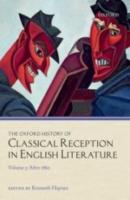
OUP (2019) h/b 726pp £75 (ISBN 97 0199585106)
This is the fifth (and last) volume in the excellent series published between 2012 and 2019, giving us a refreshing and comprehensive appraisal of how the many English writers from the early Middle Ages to post-modern Guy Davenport (d. 2005) deployed and adapted texts from the classical world. Previous volumes cover the periods 800-1558; 1558-1660; 1660-1790 and 1790 to 1880. The objective of the series is to ‘synthesize existing scholarship and present cutting-edge new research’.
The contributors in this volume hail from the UK (9), USA (8) with one each from Belgium and Australia and work in classics, English literature, history, and comparative literature. Between them they delve into and adumbrate the dynamic role of classical literature in the written word, education, and translation. Interestingly, ‘Subaltern Classics in Anti- and Post-Colonial Literatures in English’ discusses not the classics of the Greeks and Romans but the ‘canonical works of English literature’; here it is argued that the ‘great tradition’ of English literature ‘excludes writers on the peripheries of colonial culture’, thus denying ‘the very identity of Englishness of which the tradition is held to be an expression’.
For the rest we have essays on the more to be expected, covering ‘Decadence and the English Tradition’; ‘Classics, Empire and War’; ‘Post-War North American Classics’ and ‘Classics and Irish Poetry after 1960’. And then there are the nine chapters on the individual authors with six more on genres such as pastoral, myth and ritual.
As excellent as all this is, we could have done with a full chapter on Tony Harrison who is conspicuous by his near absence, although he does feature in Stephen Harrison’s chapter on ‘Classics and Poetry in England after 1960’ in the sub-section dealing with drama and shorter forms. Stephen H. is absolutely right when he calls T. H.’s masked Oresteia performed in a marathon session in 1981 at the National ‘an epoch-making event’, made all the more mesmerising by the music of Harrison Birtwistle and the directorship of Peter Hall. T. H.’s excellent translations, inflected by Old English and his intertwined modern themes, also developed in his later Medea, Trojan Women and Trackers of Oxyrhynchus (1988), are all worthy of much deeper study. Neither did Commodus (The Kaisers of Carnuntum, 1995), Herakles-Phrynicus (1995), Prometheus (1998) in his film-poem, or Iraq War Hecuba (2005) escape the magical, unnerving T. H. touch. Stephen H. concludes that this body of work is ‘the most striking and consistent engagement of classical themes and texts in contemporary poetry in the UK’. If there is ever a revised edition of the book, then a chapter on T.H. is surely a must.
There are two (pornographic but unnecessary anyway) illustrations courtesy of currently popular Aubrey Beardsley, a good 36 page index and an extensive bibliography running to 65 pages, helpfully organised by nine themes (23 pages, from ‘Sexuality and Gender’ to ‘Film and Television’), ancient authors (35 authors in 12 pages ) and modern authors (28 pages), from John Ashbery to Louis Zukofsy, taking in Auden, Beckett and Eliot, Toni Morrison, Walter Pater, Tom Stoppard and Derek Walcott along the way (63 all told).
The editors are at pains to emphasise that this book is not just another matter-of-fact-parade of classically influenced English language writers, but rather it interrogates, ‘rather than inertly reiterates, conventional assumptions about literary “periods”, the processes of canon-formation, and the relations between literary and non-literary discourse’. The guidance given to the individual chapter authors seems to have been ‘to conceive of “reception” as a complex process of dialogic exchange so that, rather than offering large cultural generalizations’ it ‘engages in close critical analysis of literary texts’.
By and large the book seems to have achieved these objectives, and is a welcome, enjoyable and happily disruptive addition to the prodigious work on classical reception in English literature.
Paul Chrystal
Author of War in Greek Mythology (forthcoming spring 2020) and of War in Roman Myth and Legend (forthcoming summer 2020).
